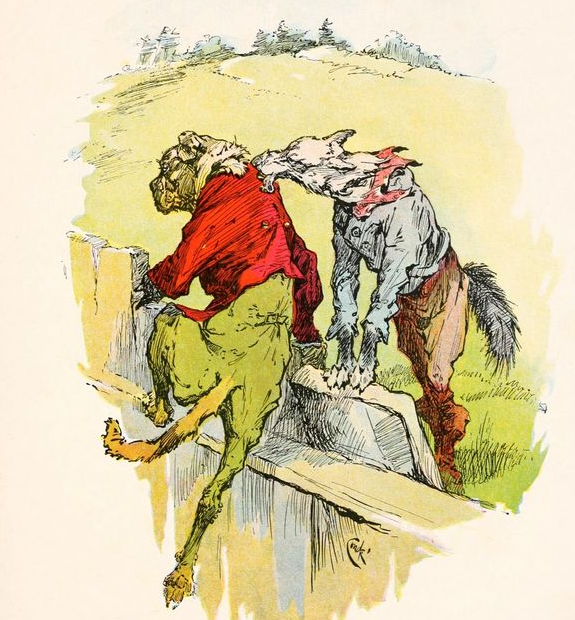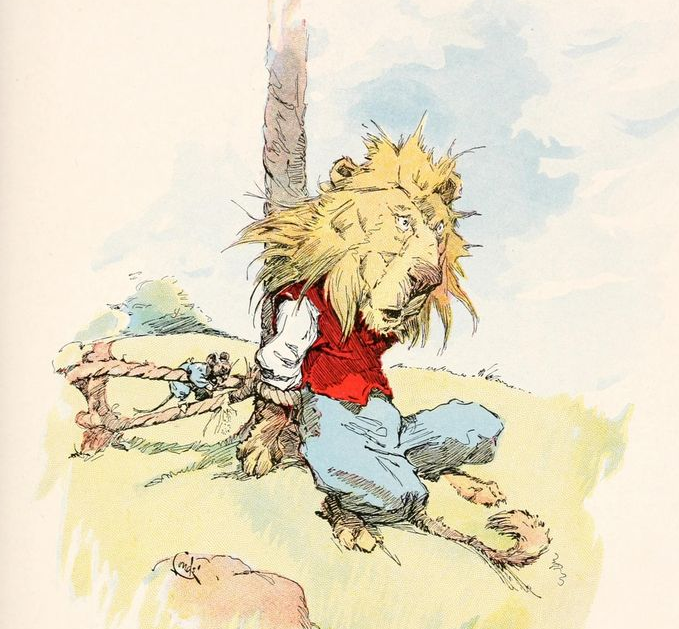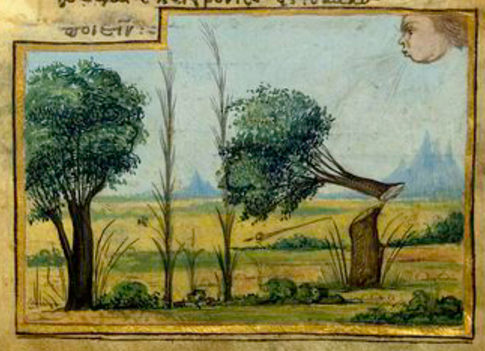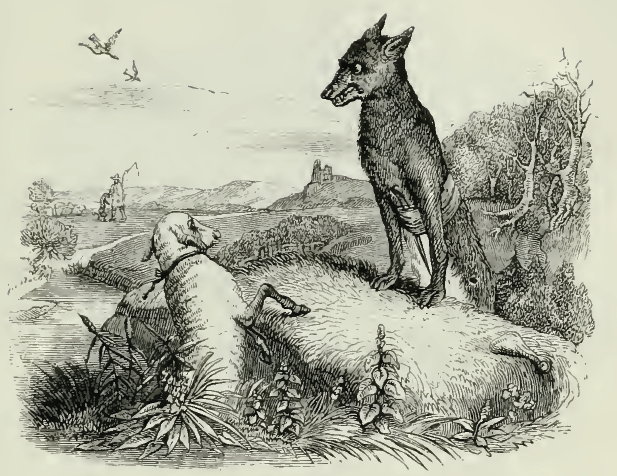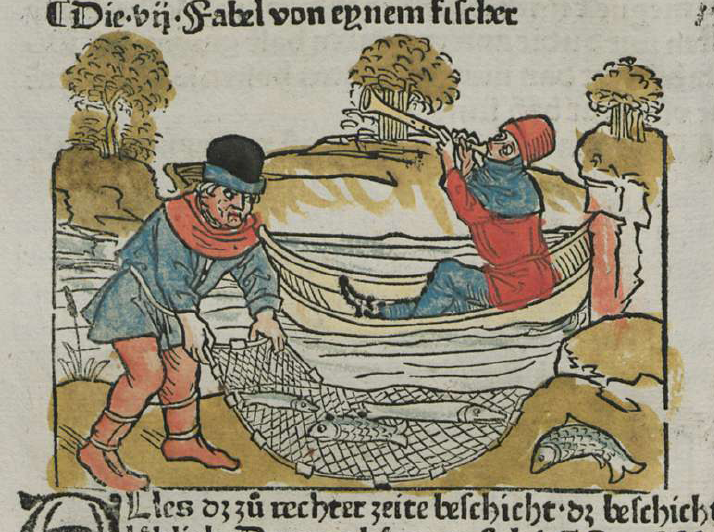Today's stories come from Colson's
Stories and Legends: A First Greek Reader which is available at the Internet Archive. You'll find the stories below, first in Greek, then segmented, and then interwoven with English; the title is linked to the Internet Archive page.
δρῦς ὑπὸ τοῦ ἀνέμου ἐς ποταμὸν ἐρρίφθη. φερομένη δὲ κατὰ τὸν ποταμόν, εἶπε τοῖς καλάμοις, πῶς ὑμεῖς λεπτοὶ ὄντες καὶ ἀσθενεῖς οὐκ ἀπολλυσθε; οἱ δὲ κάλαμοι ἔφασαν, σὺ μὲν τοῖς ἀνέμοις μαχεῖ, καὶ διὰ τοῦτο καταβάλλει. ἡμεῖς δὲ εἴκομεν αὐτοῖς, ὥστε οὐδὲ κακὸν πάσχομεν.
δρῦς
ὑπὸ τοῦ ἀνέμου
ἐς ποταμὸν
ἐρρίφθη.
φερομένη δὲ κατὰ τὸν ποταμόν,
εἶπε τοῖς καλάμοις,
πῶς ὑμεῖς
λεπτοὶ ὄντες καὶ ἀσθενεῖς
οὐκ ἀπολλυσθε;
οἱ δὲ κάλαμοι ἔφασαν,
σὺ μὲν τοῖς ἀνέμοις μαχεῖ,
καὶ διὰ τοῦτο καταβάλλει.
ἡμεῖς δὲ εἴκομεν αὐτοῖς,
ὥστε οὐδὲ κακὸν πάσχομεν.
δρῦς ... An oak tree
ἐρρίφθη ... was hurled
ὑπὸ τοῦ ἀνέμου ... by the wind
ἐς ποταμὸν ... into the river.
φερομένη δὲ ... Being carried
κατὰ τὸν ποταμόν ... down the river,
εἶπε τοῖς καλάμοις ... the oak said to the reeds:
πῶς ὑμεῖς ... How is that you
λεπτοὶ ὄντες καὶ ἀσθενεῖς ... slender and weak as you are
οὐκ ἀπολλυσθε ... are not laid low?
οἱ δὲ κάλαμοι ἔφασαν ... And the reeds said:
σὺ μὲν τοῖς ἀνέμοις μαχεῖ ... You fight the winds
καὶ διὰ τοῦτο καταβάλλει ... and thus you are cast down,
ἡμεῖς δὲ εἴκομεν αὐτοῖς ... but we yield to them,
ὥστε οὐδὲ κακὸν πάσχομεν ... and so we suffer no harm.
οἱ παῖδες γεωργοῦ τινος ἐστασίαζον. ὁ δέ, καίπερ πολλὰ παραινῶν, οὐ κατήλλαξεν. μεταπεμψάμενος οὖν φάκελον, ἐκέλευσεν αὐτοὺς κατακλᾷν. οἱ δέ, καίπερ παντὶ τῷ σθένει χρώμενοι, οὐκ ἐδύναντο. τότε δὴ λύσας τὸν δεσμὸν τοῦ φακέλου, τὰς ῥάβδους, ἑκάστην ἀνὰ μίαν, αὐτοῖς ἔδωκεν. οἱ δὲ ῥᾳδίως κατέκλασαν. ἔπειτα ἔφη· ὦ παῖδες, ὡσαύτως καὶ ὑμεῖς, ἐὰν μὲν τὰ αὐτὰ φρονῆτε, ἀνίκητοι ἔσεσθε· ἐὰν δὲ στασιάξητε, ῥᾳδίως ὑπὸ τῶν ἐχθρῶν νικηθήσεσθε.
οἱ παῖδες γεωργοῦ τινος
ἐστασίαζον.
ὁ δέ,
καίπερ πολλὰ παραινῶν,
οὐ κατήλλαξεν.
μεταπεμψάμενος οὖν φάκελον,
ἐκέλευσεν αὐτοὺς κατακλᾷν.
οἱ δέ,
καίπερ παντὶ τῷ σθένει χρώμενοι,
οὐκ ἐδύναντο.
τότε δὴ λύσας
τὸν δεσμὸν τοῦ φακέλου,
τὰς ῥάβδους,
ἑκάστην ἀνὰ μίαν,
αὐτοῖς ἔδωκεν.
οἱ δὲ ῥᾳδίως κατέκλασαν.
ἔπειτα ἔφη·
ὦ παῖδες,
ὡσαύτως καὶ ὑμεῖς,
ἐὰν μὲν τὰ αὐτὰ φρονῆτε,
ἀνίκητοι ἔσεσθε·
ἐὰν δὲ στασιάξητε,
ῥᾳδίως ὑπὸ τῶν ἐχθρῶν νικηθήσεσθε.
οἱ παῖδες γεωργοῦ τινος ... A farmer's sons
ἐστασίαζον ... were quarreling,
ὁ δέ ... and the farmer
καίπερ πολλὰ παραινῶν ... kept urging (reconciliation)
οὐ κατήλλαξεν ... but they wouldn't reconcile.
μεταπεμψάμενος οὖν ... so he sent for
φάκελον ... a bundle (of sticks)
ἐκέλευσεν αὐτοὺς ... and ordered them
κατακλᾷν ... to break it.
οἱ δέ ... But they
καίπερ χρώμενοι ... despite using
παντὶ τῷ σθένει ... all their strength
οὐκ ἐδύναντο ... couldn't do it.
τότε δὴ λύσας ... Then he untied
τὸν δεσμὸν τοῦ φακέλου ... the binding of the bundle,
αὐτοῖς ἔδωκεν ... and gave to his sons
τὰς ῥάβδους ... the sticks,
ἑκάστην ἀνὰ μίαν ... one each.
οἱ δὲ ῥᾳδίως κατέκλασαν ... They easily broke them.
ἔπειτα ἔφη ... Then the father said,
ὦ παῖδες ... O my sons,
ὡσαύτως καὶ ὑμεῖς ... it is the same with you:
ἐὰν μὲν τὰ αὐτὰ φρονῆτε ... if you are of one mind,
ἀνίκητοι ἔσεσθε ... you will be unconquerable,
ἐὰν δὲ στασιάξητε ... but if you quarrel,
ῥᾳδίως νικηθήσεσθε ... you will easily be conquered
ὑπὸ τῶν ἐχθρῶν ... by your enemies.
And here's a random proverb and a random LOLCat too:
